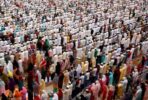Single-party governments in Southeast Asia are failing across the region unless they are able to reinvent themselves.
This was what Norshahril Saat, a PhD candidate at the Department of Political and Social Change, Australian National University and a graduate of the National University of Singapore, wrote, in The Straits Times.
“Are dominant parties of the last century doomed to fail in the 21st?” he asked.
“Twenty years ago, dominant single-parties were a recognisable feature of South-east Asian politics. Indonesia’s Golkar, Malaysia’s Umno and Singapore’s People’s Action Party were marching to the beat of their own drums, proving to be too formidable for opposition parties.
“Today, however, the drumbeats are not as confident as in the 1990s: the rhythm has either slowed down – as in Malaysia and Singapore – or is in disarray, as in Indonesia,” he said.
He pointed how “all three parties have held their congresses” over the last month.
“Umno and PAP leaders told cadres to persevere or risk losses in the next elections, while Golkar’s leaders acknowledge their crisis.”
Already, change has taken place in Indonesia.
“For the first time in its 50-year history, Golkar has become an opposition party,” Mr Norshahril said.
“During former president Suharto’s New Order administration (1966-1998), Golkar’s authority was unmatched by the opposition parties PDI and PPP. Even after Mr Suharto’s resignation in 1998, Golkar was somehow able to stay in government through forming coalitions with the winning parties and appointing members to the Cabinet.
“After this year’s legislative and presidential elections, Golkar chose Mr Prabowo Subianto’s opposition Red-White coalition.”
Golkar lost.
In Malaysia, even though the dominant party has also weakened tremendously, it has however managed to retain government.
“In contrast, Malaysia’s Umno stayed united after the disastrous 2013 elections, though the possibility of splits looms large in the years to come,” Mr Norshahril said.
“At this year’s Umno General Assembly, Prime Minister Najib Razak, who is Umno president, warned party members to unite and to kick-start the party’s renewal process. He urged senior members to give young members a chance to lead the party. The party’s deputy president, Tan Sri Muhyiddin Yassin, also urged party members to work harder to regain grassroots support, saying: “…do or be dead!””
“Similar alarm bells sounded during the PAP’s 60th-anniversary rally,” Mr Norshahril noted.
“Party secretary-general Lee Hsien Loong warned cadres to treat the next election, due by early 2017, as a national contest. He also cautioned members about possible losses if they did not work hard.
“Calling the next election “a deadly serious fight”, Mr Lee also spoke about the possibility of a freak election result that could see the party lose power.”
However, Mr Norshahril is more lenient in his assessment of the PAP.
“So far, the PAP has done everything right to avoid Umno’s and Golkar’s mistakes,” he said.
“First, PAP has given its young members more say in the party’s decisions. It has not repeated Golkar’s failures, of totally ignoring the renewal process, or Umno’s, of leaving the renewal agenda till too late.”
But Mr Norshahril questioned the wisdom of PAP’s use of “young candidates”.
“Mr Lee’s decision to place young candidates in the 2011 election appears to have backfired at first glance. Netizens questioned the fielding of Ms Tin Pei Ling – then 27 years old – who was considered lacking in political experience.
“Still, the decision has allowed the young candidates to make their mark at the grassroots level,” Mr Norshahril thought.
He also said that, “populism is necessary in politics, but does not guarantee election success”.
“PAP politicians have been actively posting selfies on social media, telling the public of their outreach.
“However, as Umno members will tell them, repeated selfies, Facebook and Twitter updates and “I Love PM” campaigns do not automatically translate into votes.
“Thus, the PAP must not rely too much on such populist moves.
This is even though the PAP has claimed that it is not a populist government. It looks like its action suggest otherwise and the PAP does seem to want to pander to populist sentiments.
However, even so, this is unlikely to matter.
What is more important is for “the PAP needs to be daring enough to break from its past, including its past ideology,” Mr Norshahril said. “Political ideologies have to be made relevant to the political realities of the day.”
However, Mr Norshahril believes that the PAP is on the right track.
“The PAP has taken tentative steps to strike out on a new path. For the first time in 32 years, it has amended the party’s Constitution, calling for a “compassionate meritocracy” and “democracy of deeds”. The party has pledged more help for those in the lower-income group and the pioneer generation.”
“The party would be wise to continue to refresh its ideology, and to allow current leaders to state their disagreements with their predecessors in a respectful manner,” he ended by saying.
However, what Mr Norshahril did not point out was that when the PAP first started out, it has started out on a constitution of “equality” but it removed this in 1982.
The latest amendment to its constitution does not include any mention of “equality”.
Moreover, it is unlikely that Singaporeans’ assessment of the PAP is as generous as Mr Norshahril.
Where wages in Singapore are one of the lowest here, as compared to the other developed countries and where Singapore has become the most expensive place to live in the world, many Singaporeans are now unforgiving towards the PAP government, believing that the PAP has “lost touch with the ground”.
Many also believe that the PAP no longer has the heart of the people and do not trust the PAP to lead Singapore anymore.
Mr Norshahril’s opinion piece seems to act as a warning to the PAP but also as a simplistic hope that the speeches that the PAP has made would actually translate into actual change. Seasoned political observers would understand that the PAP’s current behaviour is only a continuation of its use of its typical rhetoric to sway the people’s minds without any actual change to the policies.
As the Asia Regional Director for the Centre for Humanitarian Dialogue, Michael Vatikiotis, said, “for established elites in the region it’s that last point about a genuine democratic system that is hardest to swallow. Power can be responsibly wielded, even in the name of the people, but is not easily surrendered.”
It is unlikely that the PAP would give up its throne without a fight.
Indeed, the soon-to-be general election will be a “deadly fight” because the PAP will fight to the end for its hold onto power.
Source: www.therealsingapore.com







